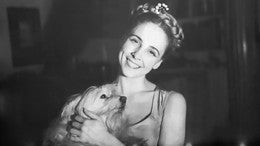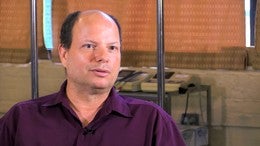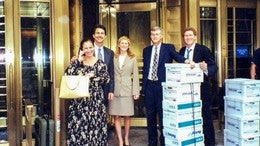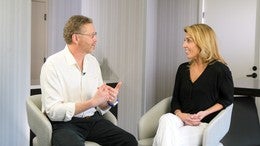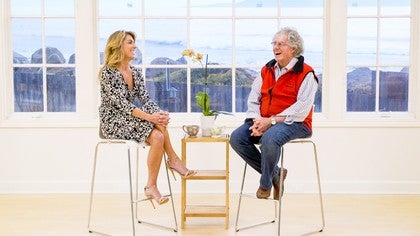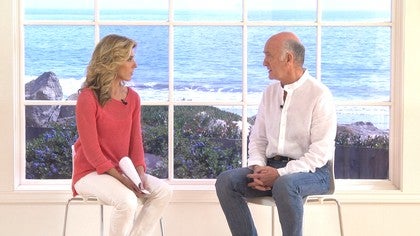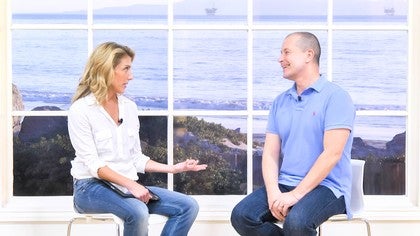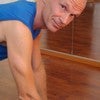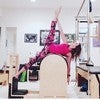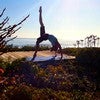Description
About This Video
Transcript
Read Full Transcript
Chapter 1
Who is John Steel?
I'm so grateful to have the opportunity to speak today with John Steele, who's unique relationship with Joseph Valadez adds fascinating dimension to our frame of reference for a man who has influenced so many of us, yet very few can claim the privilege of actually having known. I spoke first with John in an earlier interview that proved so compelling that for the sake of our community's interest, I am thrilled and happy to have John Actually come back into the studio for the opportunity to go deeper into the conversation and tell us even more welcome. Well, I used to be here. I'm telling you. It's beautiful. Thank you so much for coming back. Um, I wanna I want to summarize a little bit of what we talked about, but mostly let's just start at the beginning. First of all, you're writing a book. Can you tell me how close you are on that or where you are with that?
I know it's not an easy process.
And that's that. It will be a first draft that it's gonna take a while after that.
I'm 80 years old and I practice law in Telluride, Colorado, mostly a courtroom stuff. Uh, and I've been in Telluride for 25 years and I'm a, I'm a grandfather, a father. What else am I going to be author maybe and author anyhow, uh, and F and is it fair to say a friend, uh, of Joseph Valadez or in the past was a complicated relationship and would I characterize it as being his grandchild, but I was allowed, so it wasn't like I was a little, I always felt like a little kid around them. But, uh, I w I was, uh, I was a student, but there was something extra that was added. Uh, Mary Bowen kept saying, he always thought of me as his grandson, but I, at the time I didn't think of myself as that. I was just someone tagging along and uh, kind of fascinated by, by Joe because he was a very unusual person even at a time when people were a lot more unusual in this business than they are now now. Yeah. Oh yeah. Now everyone's pretty regular, pretty ordinary. But Joe was a very, very unusual, and before you go into how you met him, can you, can you describe Joe for us?
Very, very difficult because his, he, or to describe it, difficult to describe it because there's hardly a frame of reference. I mean, first place he was a man, absolutely obsessed with control. Ology the work that he was doing. That's all he talked about. That's all he seemed to think about. He saw people, not only the students, but he saw people on the street.
He saw people everywhere as, as people who needed to try ology. You couldn't walk 10 feet with him on the street when he wouldn't point out to you. People who were unbalanced walking with feet were terrible, who were hunched over. Uh, I mean that was what was on his mind constantly. So it's pretty hard to kind of describe someone who was that single purpose and he didn't much care about anything you did at all. I mean, he, it was completely indifferent to anything I did. Meaning as a person or as a person. Yeah.
I didn't care about fact that I was a lawyer or I was struggling in New York or having difficulty in my marriage. Didn't care a bit about that. He didn't care a bit either. By the way, if you had some physical
I wish he promoted, no doubt. But, uh, he, he's very hard to describe. I mean, if you went out to a bar with him and sat in the bar, people would look at you a little funny because he was probably dressed in and a bathing suit in the middle of New York at a tank top and flexing his muscles. I mean, he was, he was different.
Chapter 2
Meeting Joseph Pilates
we met at PMA finally after researching for you for many years. And, and I, you know, I'm always a little afraid to put myself out there, but I'm so glad that we finally got to meet and there's a, there's so much in this interview already that I know and I am going to try to go deeper. Um, that was in Denver where you are close enough to where you live. We sat for three hours I think, and at the end of that everyone behind the camera and was like, but you didn't even ask them this. So that's where we're going to go today. But I really want to hear again, how is it that you came [inaudible]
I actually sort of, uh, fell upon him. I mean, it wasn't, I met him through my mother and my mother met him through I woman called Ruth Bo core who was a choreographer at one point or a dancer at one point. She wasn't at that time and my mother sorta had developed a crush on I thought. And I think Jo thought too frankly. But anyhow, she kept saying, Oh, you've got to go to this. See this guy is just so fantastic. He can fix everything. Yeah. To me.
I think she may have been in college years or something, but certainly what made her car, damn, that lady, the woman very well. My mother's, my mother was quite vain and Ruth, Beau cor convinced her to go and she went and she I think sort of fell in love and kind of liked the work and it was very good for her body. She was much of an athlete. She in fact she was terrible athlete but this, she took two and a [inaudible] really liked that one. Yeah. Cause was very vain and uh, she really liked it. And also, uh, the other attraction to her was there was some kind of social superiority. I could use the word, she felt superior to other people because she had this little niche.
He was very socially aggressive. She had this little niche. There was so few people in the whole world that knew of her lobbies and it was really then kind of a dancers thing. It wasn't really a general thing, it just couldn't go. Uh, it was part of the world of dance and Balanchine went and Maria callous when too. It was kind of cool of my mother to be, uh, attached to this socially. So anyhow, she kept begging me. I had a kind of chronic stuff, stiff neck, so she said, Oh, show [inaudible] Mr Polis, he'll fix it. He, he's just a genius. He's just, and I was in, in the years and there were many of them where I resisted anything to do with my mother, particularly this. So I certainly don't. I W this was 63, so, and 65, I was 30. I was 28. So, and I was, uh, I didn't have a good relationship with my mother. Uh, Joe's presence in the relationship was a bad thing.
I thought I was kind of concerned that my father's feelings were hurt and this and that. So I might think with it. What about your physical background? What were you, what, Oh, I was an athlete at the time. I was a wrestler in high school and beginning of college I had the rare privilege of getting slammed around by Don Rumsfeld. He was a wrestler, he was a great wrestler and, and I was a tennis player and a squash player and I was active. But, uh, so I thought I was in great physical shape and I had this stiff neck and I, my mother just kept working on me. I'm, for some reason one day I said, all right. All right. All right. And a heavy Jewish Jackson.
And, and uh, I said, I'll go, I'll go. So I went and, uh, she made the appointment and he hardly said three words, so me plop me down on the reformer.
And I looked at this person who my mother deified and he, it was a pretty strange looking duck. Let me tell you how sir. Well, he was first place. He had this huge head of white hair, very large headed man. He was wearing just a little black baby soon. And in the middle of the hall he was very bronzed. And, uh, even though he was, uh, you know, in his eighties at time, you could see enormous muscle and veins sticking out all over, and he had kind of a boxers forward-leaning posture down. I mean, well, he looked at you with the one good. I am.
The other one was already, you know, it was a little disconcerting, but I was saying to myself, oh my mother's nuts about a minute. This is crazy. So, and then I thought, what the hell am I doing here? Um, but he, he didn't, you know, no. Uh, you know, your mother, no work, no small talks as come with me. We went into his, the s the gym 70 comment. Yeah. And uh, uh, and that's not, there's a [inaudible] story up there. Now. You probably turn left when you yeah, well he was on the, on the street side of the building and the eighth avenue side. And the woman who has the studio now, who believes she's in Joseph's studio, but she's not cause the landlord lied to her, but she's on the anyhow, you went into the right and you walked in and there was stuff I'd never seen before. I mean, no one had never seen this stuff.
I put on my shorts and he handed me a couple of, uh, I don't know what they are, the canvas, rubber bottom valets, workout shoes or some with a strap across step. And he says, put these on.
I had never been new [inaudible] studio or had a trainer or any of the things that we now kind of take for granted. But, uh, here was this guy. So anyhow, he sits me down and tells me to put my legs up on the bar, put my head between the shoulder rests and resent resolve, pushed back to this. And that was it. I started and no explanation of anything. No good, no bad. Just told me what to do and kept me doing it.
Chapter 3
Joseph's Studio
You walk in, here's this man, in my opinion, half naked, but maybe that was normal then in some way. And you walk in and what do you see?
They had cloth fee even. And uh, they were very primitive. I mean, the, uh, the foot bar was pipes. It was a curved pipe. Curved. Yeah. It was like real pipe. Not a, not a flat stuff like we have now. It was pipe that you use for your plumbing and he'd made all that bad. It was upholstered with leather, had leather straps on police that were attached to the back.
And I mean I've never seen anything like this in the distance was a Cadillac up by the front windows, which were huge and faced on eighth avenue and outside the window was one of those typical New York. I know you're a California girl, you've seen this in movies. The fire escapes that went up and down where people sat out and smoked and all that kind of stuff. And that was right out the window when w was on the second floor over eighth avenue. It was, uh, and the walls work very high ceilings. Walls were completely covered with a
That was a picture of Joe running bronze. I mean, that statue of him. Well, I mean, the thing, you know, w was
And he knew that, that I sense that. Cause when I came back out of the shower, let's say this was a Monday, he said Wednesday at seven o'clock so all he said the next week by wanting to do it again, I liked it. It was okay. He knew I vomited. I mean he could hear that. Oh yeah, he could hear that. I mean the walls were paper thin. There was only a little plastic shower curtain between studio, the Jerry, no, no one was working out. It was very early. It was probably seven and he said, Venn, that is seven o'clock in the morning. It didn't say. Okay. And that was, there was no question
That was completely weird. Uh, there was no one to talk to about this except my mother and father.
Chapter 4
Going to Joseph's Apartment
cause it sounds to me like here's this intuitive man, here's this, um, program he's giving to lots of people, has other people doing it. But it sounds like there's a connection between the two of you. I, I happen to know that you ended up going on walks with him later and things like that, but before we go there, there, when did, you know you loved it and you loved him? Like he said,
And that's where I started to become. I was literally hooked. Wow. Wow. What'd you tell your mom? That he was great. I, that a high [inaudible] actually helped me with my relationship with my mom. She was like in a state of shock herself, actually said stuff like nice to her. So, but uh, and I, I, you know, she knew Joe must have told her stuff too and there was not too long into my career of learning it that my father and mother were there together with me at some point so they could see, wow. That what was happening. They didn't come because of that. Right. But I would come maybe mid-afternoon, you know, young lawyers sometimes have really boring jobs and sometimes I just bug out and go to the gym. Nice.
Subways in New York are great and they have 10 minutes from everywhere. So I would go to the gym and then my parents had been there, but that was fun. When was the first time you did something with just outside of the studio and that you don't like? I gave a lot of thought to that when I was reading about there was Clara did that. She came up to me one time and said to me, what do you do? Eh, she, Clara was very quiet, very shy.
What do you do after work? And I said, well, I sometimes go out with my colleagues and we have a couple of drinks. I go home and she's warm. What times? I says, well, six 37. He said, she said, would you like to come up and have soup here and talk to Joe? And, and I thought, gee, it's so weird. Yeah, but I said, yes, I made, just came out of my course. I said love to. I had no idea. And that's when I would come up there. Started out probably once every two weeks or so.
And then sometimes in the morning when I came in, Joe would say, you're going to come by the night. Joe was presumptive. He didn't say, when can you come on? He presumed things. So he presumed that I'd come by fes and he was normally right. So, um, do you have any sense of how long you had known him when Clara did that then? It wasn't too long. Maybe six months. Oh Wow. Okay. That was pretty soon. Do you have any theories as to why or did they ever tell you why they were doing it? Joe Saw something, whether it was, uh, I am even the sage enthusiastic about wild stuff. Factor point. Probably not nuttiness sometimes, but I was very enthusiastic. He saw something. I was a good athlete.
I learned quickly. I paid attention. I took it seriously. Talk about [inaudible] when I went up to have told Joe ever in his life, talk to him. It's all, he's actually all too obsessed and you're that interested in and it, I go, I was interested. He didn't talk a lot. Joe Was, he talked a little about other stuff. I mean, as I got to know him and spend time with him, he'd, he'd talk about life things and talked about sex a lot. He talked about animals a lot. He talked about his summer, has frustrations with getting control, Ology to be the standard of everyone's life, which was his ambition. He railed against the medical profession. But you know, sometimes if you think back, if you had a grandfather and you were a little kid, you're holding his hand.
You kind of listened to your grandfather just ruminate about things you don't have any say. But a man wouldn't talk about, you know, whether Donald Trump should be president. They've talked about something about that own lives or what they thought your life. He, he was sort of like that with me and I was sort of a little kid, uh, to him. I was like grandson and Mary Bowen always said that. That's how she at the time saw me as his grandson. So that's what we talk about.
I can't remember a lot of the conversations. I can remember some of them. Let me ask you this, just about polarities itself are controlling it. Um, there's lots of ways to talk about delays, which could be the exercises of what, you know, we could be about what he hopes for the future of his work could be about the people doing it. Um, so I'm just trying to plant seeds. Janine, was there any direction he would talk about things or did he ever want you to teach all? No, no, no. You know, I used the word control ology to be the series of exercises that he concocted, put it an order that he insisted be done the same way by everybody all the time and that was controlling. G plot is a concept that has come in after his death, which is is really a series of exercises related to controlling g and his control ology was now along with the actual sizes, but it was the way of life. I mean it's the way you live then it was where you got your body and your mind to work cooperatively as in unison. He didn't see it as all one thing, which some people think, but he saw the mind as as totally connected to the Bali in control of the body and part of it was unconscious and part of it was conscious and the trick with everything you did, the way you walked away, you took shower, the way you slept was to get the unconscious part of your mind to control the physical actions your body took. Now it seems like, Gee, that's complicated, right? But it's not you.
Every athlete. I mean when one, when someone goes up to bat in baseball and somebody throwing a ball at them, uh, 98 miles an hour, their mind is not thinking, Gee, is that a fast ball or a curve? It's go over their body control by a part of their mind is doing all that work. They're just standing there literally. I mean they have no control over anything. They try to stop the swing sometime, but that's their mind telling the body not to swing at that ball. So he wanted that part of Ula work, not just when you, you know, when you walk, it's unconscious.
He first wanted you to get conscious about it and walk a certain, he, when you left the gym, he would stare at you and walk out and you'd say goodbye, give him five bucks and walk out. And next time you'd come in he would on the reformer or something, he would give you a little correction here or there. And it turns out he's doing that because he saw you walk a little asymmetrically. So he's using the conscious movements to correct you, make you do it consciousness, shower. And sleep come into this. Well, the of the famous shower storage, uh, which no one believes, but it's absolutely true. And there's a witness to it. It was actually speaking right now upstairs in room two oh seven that Mary, yeah, yeah.
He would go into the shower with you early on. And he went in with married men and women. Didn't matter whether with me and he would in insurance, and you go in the shower and wouldn't say a word to you that he was going to do it. He'd walk right in the locker room going into the and watch you shower for two minutes. And then he'd say no. And he'd give you this bristle e brush and this brown soap, which was the only soap in the shower. And he would start to scrub you.
And he said, this is how you take your shower. And he would scrub everybody once. And it was very German to do that, Eh, was not particularly pleasant. Uh, but, and you came out rather than [inaudible] and normally just walk back out of the shower and not say a word. And Mary's Casey said a few words about her body shocked her and uh, and with women he would actually look at their figures, uh, and maybe say something but not like, Gee, you should lose a little weight to it. We'll just say something about the bodies.
And very casually obviously saying something about everybody's body to a certain degree, but do you mean [inaudible] me about my body? But he did make sure you showered properly and I'm feeling come out kind of looking like you were pink under your clothes. He kind of knew and he'd go back and Willie and he made sure you shower, sleep. He never said anything about it until one day I was there in the afternoon. It was probably a Saturday and maybe I'd worked out in the morning and Joe and I had taken some sandwiches to central park and watch that.
He loved to watch animals in the zoo, watched them, just watch them, just watch them and see how they moved and came back and he says, come here. And he takes me over to his bed. There were two sort of army cots says lie down in his house, I'm going to this apartment. And then these two or so Barron was methodology being barren and simple or was it just I think he was poor and no money? Uh, yeah, he was pretty earthy so he lay down and mattress was there and she and a towel and some pillows and he, um, there was a lever, a lever on the right side of the bed and it was a very typical metal army. Cot says pull the lever. So you pull the lever some he made, he made, oh yeah, he made tons of stuff and uh, the, the box spring underneath the mattress, he had split it into lengthwise and built it so that it would go into a v and underneath the v connected to the lover on the right was this round metal desk.
And so when you pull the lever, it actually dropped the metal, the round desk and the thing went into a v and when you pull the lever back, it would flatten out. So you're in a v. So he puts me in this v by pulling or pushing the lever. I think Canon has annulment, has a picture of this bed and it went into the V and a mattress, Flint into a v and he says, now put your hands behind your head. He says, okay, now breeze, breeze, breeze in, breeze out. And he said, are you relaxed? And I said, yes. Very.
He said, in two minutes you'll be asleep. And sure enough, wow. And he said, we arms back here, you got supported everywhere. Your back was supporting your leg is right in the right position. You slept. I took a nap and he says, everybody should sleep on that bed.
So he was very careful about what he pushed and who he pushed his really true. Yeah. So that, is that something you just gleaned over the years or is that something that you all by hands? Okay. I didn't know he was pushing Yang [inaudible] but he was, yeah. When we were at the PMA,
Chapter 5
The Difference Between Pilates and Contrology
and I know you said something along this line, but I want, I want to see if you say it any differently or if he's done, just going to ask, what is the difference between controlling [inaudible] to you?
But yet he's gone and we started a quality pull out. Why? Why didn't you control a piece of, you know, it kind of appropriate if, if you think, I mean, I don't know it based on what you just said
That was like a variation or it was a derivative or I can't remember.
So you weren't being very at the beginning, maybe four or five times Joe or Clara or, or in my case, Bob seed early on. But Hannah, John Winners. Um, maybe one or two other people would be around, but you weren't having a private or a duet or a class. No one changed your sprain. No one raised the foot bar. No one raised the head. Whereas no one puts your feet in the scraps. No one told you what to do next. Never, ever.
So if you get stuck, which you did it all the time, at the beginning, you could learn the footwork, let's say in one or two times, and you, if you didn't get the springs, if you put them in wrong, you felt it. It was too hard or too, wow.
Inhale. As you push, exhale as you well inhale, as you expand your body and exhale as you compress it, uh, you're welcome. We have an audience here today who they're just not seeing so that you could,
You went from the leg work to the hundred to the arms, the low leg, it seemed quite easy. Uh, and there was, as I say, the running force springs and all the same, uh, the headrest was focused down and you felt bad. You pulled it up.
You learning it. So once you got stuck, you get off the machine, you walk over to the wall, look on the charts. Ah, okay. And then you go back and do your thing. Or if that didn't help, uh, maybe Clara or, uh, one of the other assistants would give you a hint, but not much. They wouldn't come change anything or fix anything or race what now? Uh, and they would correct you when you're doing an exercise. It puts you alone if you needed a push or, or they would push your shoulders down. And if Joe was there, he'd poke you and jab you.
But they will take care of five people at once that way. Uh, so what happened was after six months, you were totally independent and I mean, to this day I can lie down here and do his routine,
And the second time was when I sat down on the reformer, I kind of remembered a couple of things, swing my legs this way, remember your breathing. And by the time, six months, three year old, by everyone in this a, you know, there were no appointments that were no privates. It was nothing like that. So you just show up, you just show up anytime. If eight people showed up, uh, and you were the eighth instead. Well there were four on the reformer. And let's see that person. We'll be done pretty soon. This person. And you kind of worked it out or you said you went and did the math where you had to oh yeah, you definitely would use other equipment, but you always were aiming to get on the reformer and you worked there now?
No talking, no music, no looking at anyone. There was quite strict.
Chapter 6
Memories of Joe
That's my dad, Joe. Uh, chuck and I had quite a, there's quite a story behind that. He fought me tooth and nail saying it was not him. Yeah, cause I, I didn't know chuck and Ken and I've worked out this practical joke when I saw the picture up at Ken's a factory. So that's fine. Dad Know Chuck crap from Ford's, his fake ice starts my dad. So now it's the southern nights is my dad's. So I called up, I called up chuck blind, he didn't know who I was and I said I was closing up my dad's estate. I needed to get a copy of the release that he gave with the lawyer.
Had Chuck went nuts. It's not your father. Anyhow, I said, look, I'm not, I don't, nothing bad going to happen yet, but I need a copy of this release. And I thought, ah, he's, where'd you see that? P I told him, Ken, I knew he'd call Karen can of course supported the story. Finally he ice. He said, you know, I said, look. And finally he says, he looked at his contact sheets and he sees that the guy he took the picture of and the writer who was there that one day that chuck was there, we're in different clothes. So, and he saw Joe was in different clothes. He says, okay, it's your dad now I have the original of it. Yeah, he gave it to me.
He and his wife. So I looked him, I said, where's mine? He said, what do you mean, where's yours? I said, you're wearing a tee shirt with my father's picture on it and you didn't think to get one for me. He says, I only made two when you did a, you know, chuck, you don't know how much this cost. And I said, I'll chuck the keys. His, I mean, he didn't strip for you, right? I said, God, you're impossible. I said, you made a fortune on my father's. Patria couldn't have made one goddamn tee shirts for me. So his wife said, give them your shirt. Hey, take it all. And he gives me a shirt. I got him. He, when
Do you have any pictures inside his house? No. No, no. I don't have any pictures of the studio, although Chuck's pictures pretty much the pick that yeah, they did. Yeah. Yeah. Okay. What was your favorite moment with him inside the studio? Do you remember? Well, I ha I have, I have a lot of memories of things he said to me. I thought he said to me, uh, and I don't think I had a favorite. I have, mood wasn't one of those things.
Once I went in there with, early on with my back was really sore and I w I had never complained about stiff neck. I never mentioned and went away right away. And uh, my back with lower back. Oh. So I told them I had to fly to Texas for a case. I was pretty worried about it. And so I said, uh, no. I got my back, my lower back. He says, good, good, good. It means, funnily, it's loosening up. Oh, I sobriety. He here, we find love. Just don't leave for other words. Wow.
But I mean, it was like woo. Yeah. So he was, he was very, you. Was he a genius? What was he a genius in your mind? [inaudible] was your question you wrote and asked me about. I, I, I think he has some skills and abilities which works. Gordon, uh, part of them had to do with his own ability to sell himself and to convey this guru kind of personality or the other skill he, he had, and I don't know if it, you know, got it to a stage we call it the genius was he did see how your whole body worked. Now if you ask, uh, somebody like Elizabeth Larkam, if, if he [inaudible] really knows all the little pieces, the body and the webbing and how everything, if he knew that, I think he didn't even anatomical terms and that's right. Or he didn't know ever used an anatomical term with me. I doubt he ever used to very well. He never said, well, I'm going to your scapula. Get put your scapula together with Thor.
Your quads are this. Never ever, ever. But he did see that a few were sitting like this, telling you to drop your shoulder wouldn't fix it because you were doing this because your quad was too tight on the other. He saw that his, that genius could be, could be not. But the t the two things that he was extraordinary at, we're seeing this interrelationship of everything in your body. And he was also extraordinary. It was an extraordinary teacher, which I think he would be surprised if I said that about he thought he was just doing his job, but he had a way of getting you to do what he wanted you to do and make you think that you were doing it without him doing it.
He, he was a trickster of the first order. He tricked you into doing what he wanted you to do constantly. He didn't want to tell you to drop your shoulders cause he knew you'd walk out of the gym and you pick right back up for example. But he did want you to do something that when you picked it up you said, gee, that's not right and you dropped it. And he got you to do that without ever getting through your conscious mind.
He didn't have to tell you two and two equal four, but when you walked out, your body said g two and two equals four. I'll do that. I've always heard that you are either just as lawyer or has a business manager. Are either of those true and you know, no, neither. Neither. I did not get involve this as his lawyer until after he died.
So you are close just summering up again. He was still taking lessons. I was still taking lessons and even when he had what might've been a legal problem when Bob seed left. And there's lots of stories about that. He, he uh, he, he acknowledged that it was, could have been a legal problem just because Bob see one of the teachers laugh and stole the stills clients. Okay. I have to ask. It is a true oh yeah. Cheryl went after him with a gun. Yeah. And, and that's what I was gonna say. He came back, I was actually in the studio near one morning when, uh, Bob seed would usually come in and Bob c didn't come in now not to take care of me, but when he usually came and other people would come in, uh, so Joe came, Joe said that, uh, asked me a pub seed had tried to get me to go over to see him and I said, no, he hadn't. He said, but he's, he's got his taking, trying to take other co mourning client's mind.
Was that true or was that a fear now was that when Khloe told me, I never saw or spoke to Bob Silver again. So I don't know. Bob Never confirmed it. Bob Was this strange tract. Not everyone was strange type of. Bob was really strange. Uh, so Joe says, all right, can you take care of yourself for awhile and I could buy that. And he disappeared.
And he came back before I left and he says, I took care of a legal problem my own way. And I said, well, what do you do? He says, well, I went over to Bob seed and I put the gun right to his head. And, uh, I told him that if he tried to take away only my clients, I'd be back. And next time I pull the trigger. So, uh, had you ever known him to be violent? I know, but he was so angry at, at Barb, cause he'd rescued Bob. Bob was a mess when he got to Joe. And I kind of put the story aside till after Joe died and Claire Rings me over some of his stuff. Along came the PK wolf there. The gun, you have the gun. I had it. I had to give it up in New York because a, you can't have a gun without a permanent Newark city. So I called the police and I had surrender the gun, but Clara couldn't wait to get rid of it. And that was the gun.
And it was a very, it's James Bond's gun. Wow. That was, I wish I never gave it up, but, uh, so, but, uh, I was not his lawyer. I had nothing to do whatsoever with the business of Joe. And I believe I, I know I became the business person in the next studio or right after he died. But I did that for Clara. So Joe knew where I was a lawyer.
He may have asked me some questions here and there, but Joe had nothing to do with the law. Nothing. You didn't pay taxes, you didn't file. No social security. He didn't have a driver's license. He was not married. The Clara, he, he had no insurance, nothing. So the lawn, he told he was his lawn to himself.
Chapter 7
Joseph's Last Days
He could see his chest was working very hard, and then they put them in the oxygen tent and that was really the beginning of the end. And he was very agitated, uh, for the first day in that tent. And then I believe they started to give him morphine, uh, which calmed him down but has a sometimes very dangerous respiratory, uh, effect. Uh, but he was breathing better. Uh, but he was going in and out of sort of consciousness. It wasn't like he was in a coma, but he just slip away. He couldn't grasp the notion that you ate. He was out of control in the hospital, B, that he had some illness that he couldn't, uh, handle, and the controller he hadn't prevented and that he indeed was mortal.
Um, and he was absolutely sure he was gonna live to a hundred. And here he was in his mid eighties. He, he knew he was dying, uh, particularly in the last day. And when I left him in 11 or 10 or somewhere the evening of that day, I mean, I, I didn't think I wouldn't see him the next day, but I didn't think he'd ever get out of the hospital. Where's Clara around? Clara, uh, came mostly during the afternoons. Uh, she had very terrible vision and, uh, so, and she lived, you know, all the way across town, hated to take taxis. They had no money. And,
It was like someone wrote that somewhere and it, and that's the word. And I'm hearing furious now and I've made up a story around what he was delusion, disillusioned about. And you've told me frustrated, furious about why, why do you think, what was he disillusioned by the fact that controller g didn't go universal? Oh yes. That was one of them. The day I met him,
But he was very angry at the medical profession. He was furious at them. He just thought there a bunch of idiots and quacks and stupid. And He tried 50 times to tell them mean the way he went about it. I guess it's self-defeating, which was a lot about Joe anyhow, but, uh, he, he just couldn't believe they didn't see this thing in front of them. And it made him very angry.
And when he was in the hospital, he added his own Wong standing anger, which was from my, he knows frustration. He really believed deepness hard, that everybody had to be doing this. It wasn't, it wasn't an option. They had to do this. And, uh, if they did that, the whole world be a better place. So he, he absolutely believed that it was a religious
And they're complete disregard of this. And that's why when you walk down the street with them, he would point out that everyone on the screen should be doing control. If that person is walking like a doc and their knees are gonna be bad and this one's got their hips forward and that one's got their shoulder, I mean, everybody on the street. And on Eighth Avenue, you had quite an array of, of characters. He, oh, he would've loved
And Mo and some, for some companies it was pure mat work or pure something that he did invented. Okay. So
And I said, sure. So that started it. Uh, yeah.
But
So there was that somewhat little connection.
So we kept this completely creaky. Nine, three, nine and two. And then you moved over to 15, then moved it over there. We kept this thing going and the how, what we did. And I think w w uh, some of the people put money into it to keep it going. And, and with my father and I took care of Clara, I really mostly took care of her and made sure that she had enough money to pay the rent and buy food. That was probably a dollar a month for her. I mean, the, just the, she ate like a sparrows.
Chapter 8
Finding a Teacher to Run the Studio
Our Corolla was not in. This never came. And I, I spoke to Kathy was, I don't know if she was LMR you yet, but she was on her way and I spoke to Cathy and Corowa and asked them if they wanted to come and they wanted nothing to do with it. Nothing.
You actually didn't need, that's right. They instruct, you're doing this. They just don't come in in
And we were losing business constantly, but very slowly. And it was a small business at the time. So I was, we decided we had, we are the had to fish or cut bait. We are the had to close it down or revitalize. So we made the decision to put in a total of I think $120,000 and solicited from a much bigger group and as a capitalist, as a, as a capital infusion and to rent a much nicer, more Szekely located if the sexual word space and see if we could revitalize it. Again, I have no idea what impelled us to do that.
None of us were in the business. None of us had any interest other than finding a place to work out. Uh, we weren't thinking at all about, gee, we have to preserve this legacy. We weren't thinking that way. It was just day to day. We were thinking a bit about Clara, how are we gonna keep Clara occupied?
All of that. And I went back to Kathy and I went back to uh, uh, eve, I think it was already in. She was gone. She wasn't gone yet. What, I'm sorry, I'm looking at right. I don't know. But we went back to anybody we thought could teach it. No one was the slightest bit interested.
And one day I had dinner with remodel usually once a week. How did you know her army? Ramana? Clara and I done with Clara once a week. I'd go up there. She makes soup. I, I made sure I spoke to her frequently cause it was a little scary. I mean she's living by herself in this really kind of run down place.
And I would go into sear when I went up to work out, which was two or three times a week and just see if she was okay. And then one night a week I would have dinner with her. And so one night when we're having soup, she made great soup. She said, you know, there's this woman who Joe taught as a teenager who's, who teaches ballet. She went to Peru and all of that and got married and she's back and she's teaching, maybe she'd be interested in this.
So I said, well, I'll speak to her. So I got an a number, she lived at that point on things 66 or 60 maybe 68th street and Columbus Avenue. And I made a day where there to have coffee. And she was very kind of off putting and diva ish right from the start. Why? What do you mean? Well, as she was, she was a ballet dancer in the world of ballet and this was not ballet.
And I was not ballet. I was raised in it. Well, I mean she knew it from, she knew it, but then people outside the ballet world where Philistines and uncultured and this, this was a low, low art and you know, and she dressed, you know, very flamboyantly sorta Peruvian hippie kind of deve. I don't know if she was scary and uh, and very kind of off putting. But I went and had coffee with her and I told her what we were looking for, which at that time was somebody to run the studio. I had tea and we were going to move. And she had no interest to no interest, none.
And the plot thickens. Yeah. And I went back to Claire. I said, that didn't work. And Clara said, no, no, you, you did something wrong. She said, I think she'd love to do this if you sell it right. So I, you know, that was the pull Ali's method of instruction.
They would not you what to do. They make you learn it. It was like learning the reformers. So I thought about it and I saw my, what the hell did I do wrong? What did I do wrong, whatever. And then it finally dawned on me that Ramana needed to be a star. I wanted happened in her life, was that she went to Peru marriages, very rich guy, didn't work out. Uh, she came back, he stayed there. She pretended that the marriage was still in full bloom, but it was pretty obvious. It wasn't, uh, unless it was a completely different kinds of marriage.
Maybe Peruvian marriage, I don't know. But it was obvious she was just full of it. So, uh, as time went on, I found that, but anyhow, she needed to be, you know, she never made it as a dancer. Her son was now kind of, Paul Mahia was kind of becoming a star and he was taken up with Suzanne Pharrell, who was the mistress of Balanchine. There was a little touch and go there and all that, but Ramana was kind of a cast away ex ballet dancer who never made it.
So I thought, well, maybe we'll make her a star. So I talked to my little group and we decided we were going to give her half of the business and then make her make her a star. So I called her back up. She didn't seem very interested. I said, no, I've got something really, really interesting to talk to you about. Okay. Okay. So back down to the four brothers or seven brothers. And those days there were lots of great Greek coffee shops in New York.
There were always three brothers or four brothers, no sisters, but they're all over New York. So you remember them. So anyhow, back to the four brothers or seven brothers coffee shop and we're sitting there at the linoleum table, Greasy, we'll know William table or they're all greasy spoons. And, and I suggested to her that she had an opportunity here that we were going to give her, none of us had any interest in ownership or anything, uh, that we were gonna give her to revitalize polarities and to make something of it and a brand new story. And she was [inaudible]. So I think what I was going to do was give her a third. Yeah.
She believed that to be the case. It had nothing but it wasn't the case. But she accepted, she, she jumped into that role just like a ballet role or theater role. She jumps into the role and the rest of her life, she lived the notion that she was indeed the successor appointment
It was, yeah. Okay.
Chapter 9
New Studio with Romana
Well my architect at the time, soon to be my husband in law, ran off with my wife. Oh, uh, your husband in law? Uh, sorry.
And he said, Gee, I'll speak to grads. Alan was grandson somebody. And so he spoke to grads and grads said, well, bring me the wood thing and I'll take a look at it. So we're Mana and I schlepped this a cloth wouldn't let you shoot in the back of the trunk. Sticking out the Brooklyn and grads looked at it. Maybe she did, took pictures of it with a Polaroid camera and made aluminum versions of it, which were the first metal machines made.
And we actually met a couple of the changes to it. He did? Yeah. What? Well, I think he got rid of the curved foot bar. He made that straighter. He gave up the little, you see the little curve in the shoulder rests. Joe had even more pronounced curve and made that flat.
They were in his house. Yeah. Support. Yeah. So everything, he had this kind of double purpose thing. His bed was a, a was a tower. Yeah. So do you know, did grots actually add padding or was that something that came from [inaudible] home?
And I sat that shame.
A Romano wanted a certain floor that's all and mirrors. One of the people who did plus was a glass contractor in Long Island city. So, so all the mirrors, so we had mirrors. We, someone made a maybe grant made a formica reception desk when he came in. And the studio was very slick. And I think as I mentioned to you before, it's sort of been the prototype of every studio since it was very little stuff on the walls. There was very clean looking, very austere looking. No Oriental carpets, uh, actually no carpets ever. Uh, the floor. We had it. We were just asking that yesterday.
Is a wood floor normal or what you usually see, but, but it's, uh, what she wrote her monitored was she, she had this material that they used in ballet practice studios or something. He was a spongy hard top, but spongy was fabulous stuff. And we put that in a couple of much nicer locker rooms without lockers. And, uh, and it was a very nice match made in heaven, it sounds like, or at least it's floating. Oh, it was for, and so what, how that worked was I would, Ramana ran everything. She hired everybody, mostly ballet dancers. Uh, and why do you specify that or [inaudible] that's how ballet came into [inaudible]. Uh, very heavily influenced. So she would hire Belle ballet dancers to teach and assist and [inaudible] and as John and Hannah kind of disappeared out of the scene, uh, these dancers would become the teachers. And, uh, Clara, uh, Julie Claiborne and Romana used to bring her over twice a week and she kinda stand around and wasn't happy. Clara, Clara wasn't happy there, but she'd get all dressed up in her white outfit and her white nurse's shoes to the studio as if she was, yeah.
Occasionally if she saw someone she knew, she would say correct them or do something, but it was Romano show completely. And, uh, uh, Ramallah got along fine with her. What,
Chapter 10
How Aris-Isotoner Became Involved
Right. Oh, extremely friendly. I, I, I've spent Sunday afternoon, she had a little cell lung. She, she be clean, jumped into this role. She was all of a sudden, and, and her daughter diarrhea was, I got involved and sharing, oh, Shari and her granddaughter, Darian now and, and this, she became this whole thing. Yeah. And so she had a little sal on every Sunday afternoon in her apartment. Whole bunch of people went. And I was mostly there and I'd see her twice a week in the, and, uh, then I'd come one morning a week and go over the books and said the twice a week was getting a lesson from Gary, uh, going, yeah. For class. And I was having hip problems as was Suzanne Farrah.
So she was experimenting with both of us. It didn't work for you. [inaudible] hanging from the trapezes and upside down, stretch do this. It did nothing work for either of us. So both of us had our hips place anyhow. Uh, so yeah, I had a couple of fights, whether she had two huge Afghan hounds and she refused not to bring him to the studio and customers would complain. Uh, they were quiet, but they were big dog. Yeah. And she wouldn't listen to me and I said, it's you or them. And she went away for about 10 days and she just, Oh yeah. Uh, so how much of a pet lover, an animal of her? She is. Oh, girls, Afghans and they are the stupidest goddamn means.
I mean, I kind of think they're ugly too, but, uh, they are just so incredibly stupid. And uh, she schlepped these big white doors up, little Romana and uh, so that we had a fight over that. I think we had some arguments about personnel from time to time, but basically we got along great. And, uh, the books were fine. We decided it's just not going anywhere. And a couple of important people and kind of left a, not all for aerobics, but some, you mean w had clientele? Uh, side Coleman was there, I mean among the celebs? Uh, all, uh, y yeah. Oh, you know who was there?
The guy who's are more in order who the, the uh, prosecuting district attorney. Sam Waters. Right. He was there every day. But the guy who was there every day, and I know all of a sudden his name just slipped out of my mind, was the owner of Eris ice head toner. And he was the man who eventually bought the studio at that time there every month. Jeremy Bernstein now, no one knows Jeremy Bernstein, but Jerry May, Bernstein was a professor of physics at NYU and a world class, well known mountain climber who wrote for The New Yorker. And he was there every day. So there was this little group of people that were there every day.
But, but that was it. I mean, we didn't get any new people. The ballet people were who, uh, according to Romana, they were interns or scholarships. So they didn't provide any money, although they were very helpful in the studio. And actually great to look at. But as I worked out, but a, but how much was say Corolla Studio or now? Probably, I don't know if Kathy Studio had opened yet. I'm above, uh, an Miu, no, in Bendel's and vandals. Yeah. How much of that, the question is, do you think pulled from you or very, very little. The Bengals crowd was one of the time, a private by appointment and I think she only had two.
I think sometimes I hear that there's, there were more, but I know that it was tiny for sure. Yeah. Very small maybe to reform with very sensory room. And Carolyn's starts who owned Bendel's was one of the customers. Uh, and, okay. So that's very cool. And then Kathleen went down there and my u right.
And actually taught Polaris to my son. Yo. Yeah, he was, uh, he was in that school. So, uh, and he also dated waters in the store area. That's why I should've known that day. Anyhow, so let me, how, so I said toner. I know he's gonna play a bigger role soon. Yeah. And uh, Stanton, his name was Stan Richard, Robert Stanton. Anyhow, he decided he was going to bail us out. He knew what it was, but he felt maybe the corporate synergy and all that nonsense would help. So he bought it and that was really the last I had to do with it. Okay. And Romana and I pardon?
As good friends at that point. What year? Now? This is 78. 79. Somewhere in there. Is that when she leaves 56 and goes to 20? No. True Ego. That's when she goes to drink? Uh, yeah. One Oh two east side. Oh, I don't know much what? I didn't follow her very closely at that time.
She didn't really rise up in my, uh, uh, my sites until the lawsuit. And then is this a good time to go to that? Yeah, sure. Okay. So we sell, we'll thing, I do all the papers.
Chapter 11
Trademark Lawsuit
Stanton buys that keeps it in the same place. I think he, yes. Romana continued to run it for him at that point. And I move to Los Angeles, so I'm gone. Uh, yeah.
I moved to Los Angeles and don't do any more parties for a while with Ron here yet. Uh, Ron, yes. Ron was here. Ron got here, uh, about a year after we move to 56th street. Okay. And Ron had contacted Clara.
And, and we licensed him to, to the word plot is not controlled [inaudible] to use Paul Ali's on the west coast. We sold him a couple of grads machines, couple other things from the studio or just, uh, from, from Vermont and was selling them occasionally. I find out later she sold more than I thought, but she did sell machines and uh,
I went two or three times and [inaudible] and was very impressed. Uh, I mean he really had a pretty good crowd and all of that. So he was up and going and then he got to Ken or someone in his studio who wanted a machine, got to care. And that's how Ken started in this business. But he started a train people who became the west coast.
What I'm thinking of Diane Severino Michael Pod Wall. Yeah. And all of these people actually revitalized it from the West. Meanwhile in the east, all we had was Ramallah and uh, teaching. And then we tie Hahn who was, I think about La Dancer, I'm pretty sure it was. He bought it from Stan and it just stopped dead. What happened was from Monon began to teach privately at Draco and then sh uh, Grego as a trainer, not a pilot.
This guy was Sean Gallagher and that's where he got involved and he saw this opportunity to get the name because we tie on the name now, but how did that kind of a super key point, I think that, how did we tie, get the name? He bought everything from RSI, Soto, Stan Lock, stock and barrel. Did I say Turner? Trademark name? Nobody Trademark Sean Gallery. Sorry. So nobody trademark the name. Joe had patented a reformer back in 1920 years, something like that. It was instead of springs that had a waitstaff was a, he got a patent on that while you're were still in Germany.
And he thought that's what he would bring to the United States, but wasn't, I'll get it wrong, you're the liar. But it wasn't that Sean bought that trademark and he's on the board, but there really was not one, there wasn't one. He thought he bought a, we tie thought he bought everything. And among the everything were a lot of papers and machines and know how and this and that goodwill. But there was also this claim that he bought a [inaudible] name politely.
Yeah. Okay. And that's when, I guess in 89 98 somewhere in there is when Sean started send nasty letters
And she said, well, he's going to sue and this, that legally speak to what that means. What you just said. Well, I, I, I was of the view at the time that because people had been, we had been using the name without an trademark that we, we had allowed everyone to use it. We didn't protect it as intellectual property in any way. Gordon Trice said it was a classic generic trademark lawsuit. Well, Gordon took them much more ambitious and interesting tact on it. He said, Mike, uh, Gordon try being the eventual legal representation for [inaudible].
He was the one that, that uh, Ken eventually retained and Gordon took the position that it was a descriptive, generic, descriptive word and that described a system of exercise, like yoga describes the system or, or that fitness versus fitness or like versus something that someone owns like a, like you own the name. Google. Google owns the name. Google, although we keep using it to describe a method of research. Google it if you will please. So Google is [inaudible] identifier of a company and Gordon took the position that Palantir use doesn't identify anything other than a system of exercise. And no one had tried to prevent everyone from UCF and he prevailed with that a thing. So anyhow, 10 calls of Joan Calls me, tells me to call, can I call, can, and he gives me the story about where things are at. And I said, well, you know, I think you got a great case. So it was in New York. He re he retained a New York, uh, at the time we talked about who it was and that that case, uh, started. Uh, he actually sued showman for declaratory judgment that Shawn's trademark registration. Sean tried to register, it was invalid and that it was in the public domain.
And then as the lawsuit went on and got close to trial, that's when he hired Gordon. He was unhappy with trial counsel as I was and I was involved in, I had my deposition, I was a big witness. Uh, judge eight. Obam thought good. Cedarbaum I think what
Uh, at some of the schools do great jobs. It's, it opened it up for people's imagination therapy. It opened up for millions of things. So in your opinion, what do you, what do you think his plot is better or worse off now than what in your personal, Ah, good question. Um, since the 2000 October when the lawsuit, the term was generic, I think it so much better. We're all good. I mean, first wife Jo was killing it. I mean, hell was killing ladies had not these, uh, four or five of us done this gone. No, no question. Had Ramana not stepped up, gone. Yup. Absolutely. No question whatsoever. I mean, if needed that little bit of continuity to keep going, to allow Ron and to allow others to, to build on top of it. Uh, had the name had shown on the name. I mean, I just can't imagine it's just unimaginable. But, uh, I mean, what do you mean? Well, you know, he's a bad guy. I, you don't want a bad guy to be owning the name.
Telling people what they can do. Licensing. I'm getting royalties from them, telling them what equipment they can use, telling them what Napkins, towels, what, how they have, I mean, he owned the name [inaudible] mean to you? To me.
Chapter 12
What Pilates Means to John
Is that for just the sake of finishing it or is it just needs to, it needs to be done. I've done so much on it. Uh, it's, it's has a, again, it has some effect elsewhere my whole life. And you know, I don't have, I, I take very few cases now and many of them I wish I hadn't, but this, I'm very happy I'm doing so. And I started the other thing, you know, like I think I'm going to enjoy that. Getting the shit kicked out of me by people said, what guy?
Hell that's boring. Oh No, the march all over. Repetitive, boring. But that's good. That's good. Yeah. So what is, if anything is still mystical about is for you, it's the mystery. The mystery is still there. I don't know. I spoke at length to a couple of, you know, world-class teachers and, and I'm gonna ask Amy the same question after I get to know her a little better. Uh, why do people keep doing this?
And it's, it's not easy to put in words if at all. I mean, it's, it's difficult. It's unbelievably expensive. It's a commitment of time for busy people that don't have a lot of time, but find it for this. There's a lot of reasons not to do it. There's a lot of reasons to go to soul cycle or run around the reservoir or get on your bike, uh, and not be involved and make appointments and show up at a certain time.
I mean, it's a, it's a pain in the ass activity that people who treat more, it's seriously than doctor's appointments. They show up late for doctors and dentists, but they're there at the pilings, his class and, or at the session or wherever it is. So there's some, which may be the readers of the book, we'll find ways to fine, but I'm almost happy not being able to say, gee, we it because
People are tired of it. That I couldn't do it. There was a trend called, it's this, and I called up Ken, I said, have, how's your reformers sales since the booming? And then I, I spoke to a couple of people in New York. How's Your Business? Fantastic. So, uh, oh, uh, what's her name? St John wrote, wrote that the counter piece. Nora. Yeah. And Elizabeth Anderson did one as well. Yeah. Yeah. So, well, okay. Uh, it's, it's just a great thing and it's, you know, it's good for cocktail parties and nothing else to say, Gee, the weather's nice and I'd go on and Santa Barbara Houses. Well, I care you're involved with politics a little bit. So, I mean, it's, it's means a lot to me. I guess.
Can you just give me some story about what plot is, is today in your opinion? Well, today glottis is a miracle. I mean, that's, it's just an amazing phenomenon that this little gymnasium that I encountered in the 1960s, which had no appeal whatsoever to a broad public. It had an appeal to a very, very narrow group. Is today something that you can go to Bangladesh, you can go to Singapore, you can go to anywhere in India or any big
It's helped thousands and hundreds of thousands of people. It's employed in very, uh, very, uh, in a very good environment, a very healthy environment. Uh, hundreds and hundreds and hundreds of people. And it's, you know, it's a word that, uh, if you read the paper every day, you see it every day. There isn't a day that goes by where you don't see Paul Ali's or some comedian is making a joke or it shows up in a movie or on, I mean, all of this happen. Uh, it's a miracle. There's something,
And I think almost everybody along the way. I mean when I speak to Ken the same thing. He wasn't out to build an empire of this thing. We just made machines. So that's part of it. It's, it's a big part of it. No. Well I love being here. Nice to meet you. And Yeah,
I look forward to more and I really look forward to the book when you finish. So keep going. I'm working today, so thank you very much. You're very welcome.
Chapter 13
Q&A
So now what I'd love to do is just open it up to a couple of questions some people have written in. Um, I have some of my own that aren't right in chronological order, so I didn't know when to bring them in. So that's what I want to do now. So the first question is, um, uh, Ruth Alpert, one of our PyLadies anytime instructors is asked, um, if she's curious to know if you ever came across Eve gentry during your time at the studio between 62 or three and, um, I think 72 72. Did you ever, what was your experience with you gentry?
Did you have a favorite that you would choose?
I at one time thought I was certified on the a hundred. I thought I could teach the hundred. I can count well
I just think you, when you see someone do the teaser, right, you kind of know deep down that they have control of their own
There's so many stories sitting up in your experience base. Not at 7:00 AM, maybe. No, he, at the end of the day he'd put a cigar or sometimes in a pipe and smoking, you know, but he didn't smoke much. Okay. And, uh, he didn't drink much. It was pretty healthy but normal. Yeah. But there's all kinds of rumors. But uh, in terms of Hannah, I'd certainly never crossed my mind. When was the last time you saw her? 19 probably 1970, 71, somewhere in there.
John Winters was the organist at radio city musical and uh, I think as Ramana kept bringing in the weak tie Hans on the ballet, the female ballet dancers, girls, they call them, uh, I think they felt a little finished. And then once the business was sold I was out of there. Yeah. And that when your gap was the 10? Yeah, that's when the gap was and I was just done with it. Uh, uh, I was going through my own problems and moved to California where everyone with problems moves? No, not really. But, uh, I moved to Los Angeles cause, uh, one of my big clients moved here and I was just done. So I didn't follow it up there with no retirement party
Maybe Jim Lipton would know where they are. But
We went riding together. We ran to dead horses. Uh, we went out to dinner a lot. Uh, I, I, I was single mostly or single, but married, you know, about that state. I kind of did. Yeah, it's not good. But anyhow, uh, I've lost contact with them. Uh, I mean, I could definitely get in touch with them, call them,
He was wonderful. Taking care of Clara. He took care of, he was one of the people that I relied on to help with Clara, and he was great with her. He gave her obituary. He was, he was very attached to her.
He didn't care whether it was, you know, George Balanchine or anybody that he treated, everybody want exactly the same and that's not necessarily attracted to the same good. He just treated, he had a certain way. But Clara brought a lot of warmth and stuff into it. And certain men in particular, w they, they found their mother I see at last. And uh, she was definitely that. She was never that to make a gel was my grandfather.
Maybe Clara was just someone I, I, I guess, well, I love my real grandmother and, uh, I didn't have a real grandfather, so, uh, there was a little of her in that, but for some men, uh, and Jim was one of them. They were, they just thought Clara walked on water and if Joe corrected them when they were doing an exercise, they get a little testing. But if Clara [inaudible] they did it like right away. It was, uh, it was quite a side. Coleman was another one, uh, that, uh, they just adored. Clara Bruce really enjoyed there. So,
The Teacher's Corner: Discussions
Comments

You need to be a subscriber to post a comment.
Please Log In or Create an Account to start your free trial.
